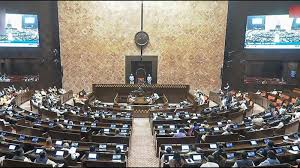“Rule 267 weaponised as mechanism of disruption” – Read
Rajya Sabha chairman Jagdeep Dhankhar on Friday adjourned proceedings for the day after disruptions by the Opposition over the Adani issue and violence in ethnic strife-torn Manipur and Sambhal in Uttar Pradesh, saying Rule 267, under which adjournment notices were moved, “is being weaponised as a mechanism of disruption”.
After the listed papers were laid on the table of the House, Dhankhar said he had received 17 notices under Rule 267 which allows members to move for the suspension of rules to discuss urgent matters, and that he was rejecting all the notices, leading to loud protests by the Opposition.
As he adjourned the House till 11am on December 2, Dhankhar expressed anguish at the disruptions.
“We have already lost three working days that should have been committed by us for a public cause… I call upon you for deep reflection. I express my deep anguish. My absolute pain is that we are creating a bad precedent and we are dishonouring the people of this country. Our actions are not people-centric. We are getting into irrelevance,” Dhankhar said.
Proceedings in Parliament have been stalled since the beginning of the Winter Session amid protests by opposition parties on allegations of corruption and wrongdoings against the Adani Group, communal violence in Uttar Pradesh’s Sambhal and ethnic clashes in Manipur.
On Friday, PTI said Congress MPs Pramod Tiwari, Ranjeet Ranjan, and Vivek Tankha were among those who had given notices to discuss the alleged corruption and wrongdoings against the Adani Group. John Brittas and AA Rahim of the CPI(M) sought a discussion on the recent violence in Sambhal. Sanjay Singh of the AAP had given a notice to take up the issue of “rising” crime in the national capital, while party colleague Raghav Chadha wanted a discussion on the alleged atrocities against Hindus in Bangladesh and the arrest of Hindu spiritual leader Chinmoy Krishna Das.


Comments are closed.